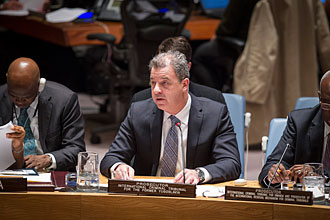Completion Strategy Report: Prosecutor Brammertz’s address before the United Nations Security Council

Prosecutor Serge Brammertz addressed the Security Council today, presenting the 22nd report by the Office of the Prosecutor (OTP) on the progress towards the completion of its mandate. In his address Prosecutor Brammertz provided an update on the current status of trials and appeals, cooperation between the OTP and the countries in the former Yugoslavia, and national war crimes prosecutions. The Prosecutor addressed the Šešelj case in particular and the reactions Šešelj’s negative rhetoric caused in the region, as well as the need for a trial judgment in this case to be issued as soon as possible. He also spoke about the need for an intensified search for missing persons in the region. Noting the currently strained relationship of trust between the Tribunal and its supporters, the Prosecutor pointed to the importance of reflection. Prosecutor Brammertz concluded by emphasising the OTP’s commitment to finalize its work in accordance with the Completion Strategy.
At the outset, Prosecutor Brammertz pointed to the completion of the trial of Radovan Karadžić during which the OTP and the Defence called more than 550 witnesses and submitted over 10,000 exhibits, totaling 165,000 pages of transcripts and documentary evidence. He expressed the OTP’s gratitude to all victims and witnesses who participated in the trial and contributed to ensuring justice: “Without their courage, this trial, like all others, would not have been possible.” The Prosecutor also mentioned that in the two remaining trials in the courtrooms, Mladić and Hadžić, the Defence is currently presenting evidence. Appeals proceedings are ongoing in five cases.
Prosecutor Brammertz noted delays in the Hadžić and the Šešelj cases arising from factors beyond the OTP’s control. Reacting to the latest delay in the Šešelj case, the Prosecutor said, “The OTP understands and shares the frustration of many that the trial judgment has not yet been issued when the last witness testified in July 2010 and the trial closed in March 2012.”
Prosecutor Brammertz also discussed events following the Trial Chamber’s recent decision to grant Šešelj provisional release. The Prosecutor reported that in light of Šešelj’s disregard of the Tribunal’s orders and insults to victim communities, it was necessary for the OTP to ask the Trial Chamber to revoke the provisional release. Recognizing the intense public reaction to Šešelj’s release, the Prosecutor said, “It should encourage us to redouble our efforts to ensure accountability for serious violations of international humanitarian law and to firmly stand against all forms of revisionism.”
Turning to the issue of cooperation between the Tribunal and the countries of the former Yugoslavia, Prosecutor Brammertz said that it continued to meet the OTP’s expectations.
As regards national war crimes prosecutions in the countries of the former Yugoslavia, the Prosecutor stressed that further improvements are needed. He noted that regional cooperation agreements have not yet been widely put into practice, and that the significant investments in building the capacities of national justice sectors have not yet yielded proportionate results. Nonetheless, the Prosecutor recognized that prosecutors in Serbia and Bosnia and Herzegovina had recently carried out a joint cross-border arrest operation: “This is a very positive development that demonstrates how much more can be achieved through effective cooperation."
Regarding war crimes prosecutions in Bosnia and Herzegovina in particular and the Category II cases transferred by the OTP, Prosecutor Brammertz reported that five Category II cases still remain unresolved. He also reported concerns from the National War Crimes Strategy Supervisory Board and the state-level judiciary that the work of the Prosecutor’s Office is not moving in a positive direction. The Prosecutor concluded, “Nonetheless, while the list of challenges is long, good management and leadership in the Prosecutor’s Office can put matters back on track and build upon past achievements.”
Prosecutor Brammertz further reported on his many recent meetings with victims, underscoring that important issues still need attention. He noted that reparations for victims of the conflict have not yet been fully and fairly addressed. Recognizing that many families throughout the region still do not know the fate of their loved ones, the Prosecutor emphasized, “Efforts to search for missing persons must be maintained and intensified”.
Recalling that last year he had reported that the relationship of trust between the Tribunal and the public was under strain, Prosecutor Brammertz said, “Unfortunately, among victims and the Tribunal’s supporters, many do not believe the situation has improved.” He noted that critical reflection is still needed at the Tribunal. The Prosecutor further remarked, “As in national courts around the world, at international tribunals there should not be tension between judicial independence and efficient case management.”
The Prosecutor noted that the Tribunal’s legacy should not be measured by the past few years alone, recalling that there have been many important achievements in ensuring accountability for crimes committed during the conflicts in the former Yugoslavia. The Prosecutor said, “In just a few years the Tribunal will complete all of its outstanding work and close its doors. Only then can the Tribunal’s legacy be fully assessed.” Prosecutor Brammertz concluded by reiterating the OTP’s commitment to completing its remaining work as efficiently and expeditiously as possible.

